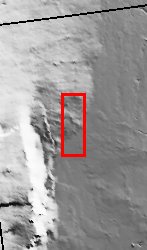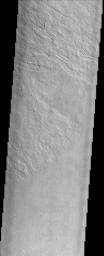Olympus Mons Lava Flows
Caption:

(Released 05 April 2002)
Olympus Mons stands 26 km above the surrounding plains, which is three times taller than Mt. Everest, and is the tallest volcano in the solar system. Olympus Mons is also wider (585 km) than the state of Arizona. Although these are impressive dimensions an astronaut would find walking these slopes easy, as they are typically only 2 to 5 degrees. This image contains numerous lava flows, leveed lava channels, a discontinuous sinuous rille (thought to be a collapsed lava tube) and lava plains. Close examination of the sinuous rille reveals that portions of the roof of the lava tube have not completely collapsed. All of these features can be seen in basaltic (iron and magnesium rich black rock) volcanic regions on Earth like Hawaii and Iceland. Impact craters are scarce, indicating a relatively young age (several hundred million years old) for these surfaces.
Cataloging Keywords:
| Name |
Value |
Additional Values |
| Target |
Mars |
|
| System |
|
|
| Target Type |
Planet |
|
| Mission |
2001 Mars Odyssey |
|
| Instrument Host |
Mars Odyssey |
|
| Host Type |
Orbiter |
|
| Instrument |
Thermal Emission Imaging System (THEMIS) |
|
| Detector |
|
|
| Extra Keywords |
Crater, Grayscale, Impact, Mountain, Volcano |
| Acquisition Date |
|
| Release Date |
2002-05-21 |
| Date in Caption |
2002-04-05 |
|
| Image Credit |
NASA/JPL/Arizona State University |
| Source |
photojournal.jpl.nasa.gov/catalog/PIA03763 |
| Identifier |
PIA03763 |


